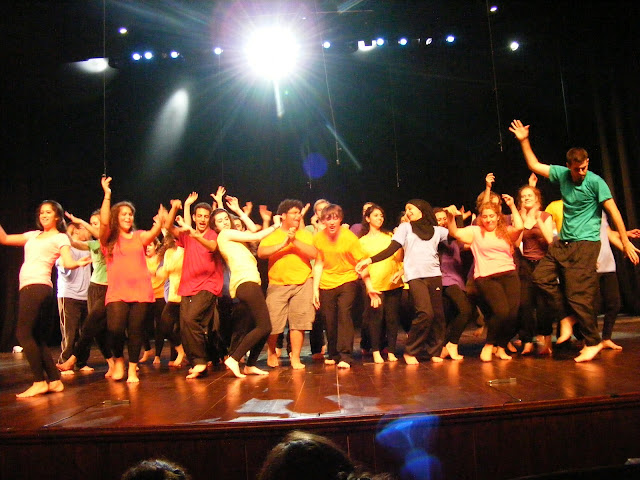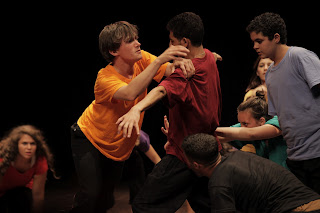خطوة في بكرا
A Step into Tomorrow
 |
The Final Performance
 |
| photo credit Dr. Abdallah Abu Shararah |
Ashtar Theatre has
organized an International Festival for youth between the 7th and
the 17th of July 2012. The festival comes as a celebration of the
theater’s 20th anniversary and the huge global success of Gaza
Monologues.
The Festival “ A Step
into Tomorrow” has consisted of several
different workshops that functioned to prepare the festival’s participants for the
final performance that was performed on the 17th of July, the last
day of the festival at the Cultural Palace in Ramallah.
 |
| From left to right (Emile(Palestine), Sophiem Barclay (Denmark) and Majdi( Palestine)) photo credit Dr. Abdallah Abu Shararah |
The festival has
invited several theater groups and individual with theatrical and artistic
backgrounds from several countries such as, Germany, The United Kingdom, Italy, Denmark, the United States, France, Poland, Ukraine, and Jordan. The Festival has also
invited many of the local theaters, such as the Freedom Theatre (Jenin camp),
Al-Hara theater (Bethlehem). Unfortunately and for financial reasons, many
other local theaters were unable to join the festival such as “Oyoun Theater” (Majdal-shams)
and “Yes” Theater (Hebron).
 |
| Marie Popall (Berlin) photo credit Dr. Abdallah Abu Shararah |
The final performance
was performed by 46 international and local actors. The final performance
carried the name of “A Step into Tomorrow” and consisted mainly of several
different scenes that represented various subjects and topics which all pour
under the same theme “A step into Tomorrow”.
The Festival’s
participants were trained mainly by four trainers: Lydia Ziemke (Germany), Utah Plate (Germany),
Annet Heinemann (Holland/ Italy), Fernando Nope (Sweden), and was supervised by Iman Aoun (Palestine).
The Festival's schedule with details:
1.
7 July 2012 – The opening ceremony was held
at ASHTAR Theatre. ASHTAR Theatre
International Youth Festival - ATiYF is a continuation step of
The Gaza Mono-Logues. Therefore, it was inaugurated by a presentation
of the three documentaries of The Gaza Mono-Logues that represented
the project from its local idea to its global implementation in the different
countries around the world, ending with the performance at the UN in November
2010. The trilogy of the documentaries, 25 minutes each, shed light on
the human rights aspect of the project and on the youth of Gaza who had written
the monologues and the youth of the world who had believed in their cause
and raised their voices onto the world stage. The audience
members at ASHTAR Theatre who attended the ATiYF opening were very touched and
amazed by the energy of the youth participating in the project. Some of the
international audience members were participants in the project and were very
emotional about seeing themselves in the documentaries. ATiYF was aiming at
giving a strong platform for youth to affect and enhance their future
positively and they did.
90 audience members attended the
opening. They came from the different cities of the WB in addition to the
international participants of the festival. Adults represented 33% (14 males
and 16 females), youth represented 61% (25 males and 30 females), and a few
children 6% (3 males and 2 females).
The event was followed by a
reception attended by the audience, the donors, and festival participants and
ASHTAR staff.
2.
8 July 2012, “Face Hook” - a performance
of Al Hara Theatre at Alrowwad Cultural and Theatre Training Centre – Aida
Refugee Camp. The audience were 150 persons, and they came from different
places; Aida Camp, Beit Jala, and Bethlehem. The majority were from Aida Camp
around 75 persons, those who came from Beit Jala and Bethlehem were around 25,
and the festival participants 50. Adults represented 37% (35 males and 20
females), youth represented 50% (35 males and 40 females), and 13% were
children (10 males and 10 females).
Following the performance a
discussion took place around the themes of the presented play. The topics were
related to youth concerns and suggested that social issues of youth are not a
priority like political and national issues. The actors along with the majority
of the audience were also involved in asserting the importance of presenting
such social issues that relate to the youth sector.
Post the performance the festival
participants took a tour inside the Refugee Camp and talked with several people
about their situation, problems encountered and difficulties faced living near
the wall. They were also taken to Solomon’s Pools and the Nativity Church in
addition to a tour in the old city of Bethlehem.
Also on the way to Bethlehem in
the bus there were lots of discussions and briefing for the international
participants on the prevailing socio-political realities in Palestine. They saw
the settlements and the separation wall. This evoked many questions and
nationals clarified the situation.
A second activity was supposed to
be playing at Alrowwad that evening, a documentary film called “Stones” on the
role of drama. Produced by Görhönufilm and directed by Daniel Misota one of the
participants from Hungary, who couldn’t arrive with the film on time therefore
it was canceled.
3.
9 July 2012, “For Adults Only” a
performance by ASHTAR Theater students, at ASHTAR Theater. 40 people were from
the festival participants and 70 others came from Ramallah and Al-Bireh
Governorate. Youth represented 62% (30 males and 38 females), adults
represented 35% (18 males and 20 females), and children were only 3% (2 males
and 2 females).
The performance was praised by
the audience, and congratulated the graduating students on the calibre of their
theatrical skills.
4. 11 July 2012,
“The Auction” the performance of Teatro di Nascosto, at The Freedom Theatre,
Jenin Camp-Jenin. Freedom Theater hall was packed up with people from the Camp,
the city of Jenin and the Festival’s participants. There were about 200
persons. Youth represented 70% of the audience’s majority (75 males and 65
females), while adults represented 25% (30 males and 20 females), and children
were 5% of the audience (8 males and 2 females).
During
and after the performance of “The Auction” a huge interaction between the
audience and the actors was noticed. This was due to the great acting and the
very evocative theme of selling precious and intimidating items. After the
performance has ended, the Festival’s participants were taken on a tour in
Jenin Refugee Camp. The participants were shown were Juliano Mer Khamis was
assassinated, Jenin’s Martyrs’ graveyard, and the Camp where hundreds of
Palestinians were murdered and more imprisoned.
5.
16 July 2012, The Closing
Ceremony was held on the last day of the Camp-Festival, and took place at
Ramallah Cultural Palace.
The donors were honoured and were awarded trophies.
Also the local and international participating theatre groups and the
international trainers were awarded trophies. In addition, Ashtar Theatre
trainers who were responsible for training the graduates throughout their
journey with Ashtar were
also honoured (Mohammad
Eid, Bayan Shbib, and Raed Al Ayasa)
It is worth noting that the masters of the ceremony
were three of the graduating students. The graduation of Ashtar Theatre’s seventh class was followed for
the 11 students.
The feature event of the ceremony was a huge
performance “A Step into Tomorrow”; the joint performance represented 46 local
and international theater students, who danced, sang and acted in front of
around 600 people who came from everywhere mainly from Ramallah and Al Bireh
Governorate, Jenin -
mainly Jenin Refugee Camp, and Bethlehem Governorate. Several themes were
presented within the performance, which was related to the issues pertaining to
the participating theatre students at this stage of their lives such as: war,
separation, love, identity, brotherhood, checkpoints, occupation, self
discovery, prison, resistance, society, social classes, sex and religion.
The audience
were mainly youth and represented 58% (170 males and
180 females), adults
represented 35% (100 males and 110 females), and a few children represented 7% (22 males and 18 females).
Challenges faced:
In spite of the fact that the fund-raising
phase started in September 2011, it took almost 10 months in this endeavour.
The major problem faced by Ashtar Theatre
administration and the students organizing the festival was the lack of funds.
Almost 18 Palestinian companies/firms were contacted; we were not
successful in securing the planned budget for the project. In addition to the
main donor namely Sida – Sweden, we managed to secure the support from only 4
companies/firms their support for the festival (PADICO, Amarizian Publishing,
Golden Globe Tours, The Episcopal TVT Centre – in kind contribution, National
Beverage Company – in kind contribution). Unfortunately, this not only asserts
the continued lack of opportunities for professional development and incentives
for artistic innovation, but also reflects the realities of our society that continues
to have a low level of awareness and appreciation of culture in general and
theatre in specific.
The international cultural centres in
Ramallah supported some of the travel expenses of their nationals (e.g. Goethe
Institute in Ramallah covered the cost of 7 participants from Schuabuhne). The
French Cultural Centre in Ramallah covered the accommodation of one French
person. The European Cultural Foundation covered the travel expenses of 10
members of Theatre di Nascosto.
This situation has lead to making some
drastic changes throughout this period. The budget had to be modified and cut
down almost after every meeting with the graduating students, meaning some of
the expenses had be cut out and do the festival without them. For example, we
had to ask the international participants to cover the cost of their travel
till the borders. Thus only 23 internationals were able to join the Camp-Fest.
We lost two theatre groups that were eager to participate; The Zimbabwean group
“Zambuko/Izibuko Theatre Group” and a Tunisian group “Theatre Plus” since
they were not able to raise the funds for their travel, although they have
tried till the last minute. Also lack of funding led to taking the participants
to Bethlehem and Jenin only unlike our previous ambition to expose them to
several towns, villages and refugee camps in the West Bank.
Challenges Overcame:
Regardless of all the challenges that were
faced, the graduating students managed to make it happen. They were able to
hold a festival with participants from all over the world. They worked very hard
over the 10 days, and came up with a show with their local and international
counterparts that combined all of their talents from dance, to music, to acting
in one show. They were able to learn a lot, meet new cultures, widen their
horizons on different issues, and make new friends.
Images from the Festival and the final Performance:
 |
| from left to right Darine (Jordan), Alex (UK), Mo'ayad(Palestine), Kamal (Palestine), Nizar(Palestine) photo credit Dr. Abdallah Abu Shararah |
 |
| from left to right Melkar( Palestine), Joanna( Germany), Arabella(UK) photo credit Dr. Abdallah Abu Shararah |





Weather in Ukraine is rather cold and snowy, but you can enjoy your travel to this country. Night clubs and restaurants are at your service. Moreover, you can go to a theatre. Every Ukrainian city has original theatres with very interesting performances. You can choose the right place to go in the directory of Ukrainian theatres. Ukraine travel Guide also contains information about cafes, pubs, taxis and much more services you may need in Ukraine including accommodation, food, entertainments and services.
ReplyDelete